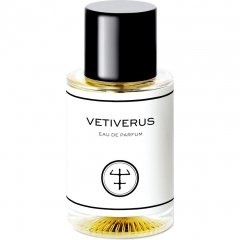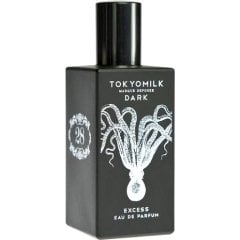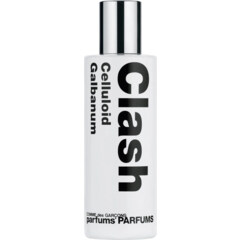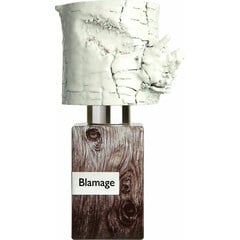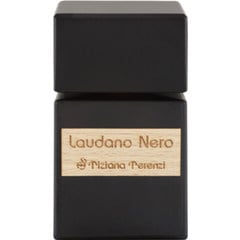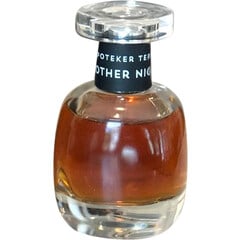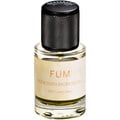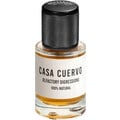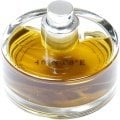
Soap
Reviews
Filter & sort
Translated
Show original
Black Apricots
Vetiverus is one of the four Avant-Garden Lab fragrances I recently tested. And it is one that stands out clearly from the quartet (Veil, Orion, Ambergreen, Vetiverus), by its, even if only supposed, naturalness.
The fragrance starts herb-sweet and tarry-smoky: as if one had torn open fleshy, amber-colored dried apricots, and immediately pulled them with relish through a bowl of tar.
This harsh and tart combo may seem animalic - but "Salamanca | Olympic Orchids Artisan Perfumes" comes more to mind: well-matched here with the original version of "Bat (2015) | Zoologist".
Vetiverus could easily have come from Dr. Ellen Coven's box of ideas - so surprising it seems to the otherwise monothematic and carefree synthetic experiments from the lab of avant-garde Oliver Valverde.
Tarry smoky notes and tart, overripe, fruit-led sweetness create a wonderful and versatile mid-weight scent here:
Sprayed on clothing, the first accords catch in the fabric and congeal.
On the skin, however, unfolds - after several hours - a gentle vetiver with a nice osmanthus impact. I as a hobby nose, believe here both can distinguish well, and the long asphalt path through the warm and humid fruit leather jungle I like extremely well.
Tar and smoke with flowers or fruits to flank, is probably no longer the absolute avant-garde, yet Vetiverus with its two ignition stages and the beautiful metamorphosis into the green and tangy, is hardly a mere provocation, but rather a rather well thought out composition.
That Ambergreen bagged the laurels of the jurors at the time is somewhere understandable; Vetiverus probably appeared on the radar of very few - wrongly, in my opinion. A massive stuff, and a bold olfactory statement.
The fragrance starts herb-sweet and tarry-smoky: as if one had torn open fleshy, amber-colored dried apricots, and immediately pulled them with relish through a bowl of tar.
This harsh and tart combo may seem animalic - but "Salamanca | Olympic Orchids Artisan Perfumes" comes more to mind: well-matched here with the original version of "Bat (2015) | Zoologist".
Vetiverus could easily have come from Dr. Ellen Coven's box of ideas - so surprising it seems to the otherwise monothematic and carefree synthetic experiments from the lab of avant-garde Oliver Valverde.
Tarry smoky notes and tart, overripe, fruit-led sweetness create a wonderful and versatile mid-weight scent here:
Sprayed on clothing, the first accords catch in the fabric and congeal.
On the skin, however, unfolds - after several hours - a gentle vetiver with a nice osmanthus impact. I as a hobby nose, believe here both can distinguish well, and the long asphalt path through the warm and humid fruit leather jungle I like extremely well.
Tar and smoke with flowers or fruits to flank, is probably no longer the absolute avant-garde, yet Vetiverus with its two ignition stages and the beautiful metamorphosis into the green and tangy, is hardly a mere provocation, but rather a rather well thought out composition.
That Ambergreen bagged the laurels of the jurors at the time is somewhere understandable; Vetiverus probably appeared on the radar of very few - wrongly, in my opinion. A massive stuff, and a bold olfactory statement.
5 Comments
Translated
Show original
Tales from the Crypt, No. 28: The Morning
It is morning. I get up and go to the kitchen; I decide to make myself some porridge. I put the milk on to boil and throw the oatmeal in already.
Before I go any further, I jump into the bathroom for a quick shave. But I have not enough shaving soap there, so I stretch the existing soap remains simply with bile soap. This works quite well and smells not quite as mossy as usual.
Shortly thereafter, I go back to the kitchen, and come just in time: the milk boils and I still manage to lift the pot from the plate - the rising milk cap does not come over the edge - Phew, again.... Pscchhhht. Pshhhhht. A few drops obviously made it out after all, dancing hissingly on the glowing plate and rising in fine wisps of smoke. It almost went really wrong.
I put the pot down, remove the sorry milk skin and vigorously stir everything. It can go on. But the olfactory mixture of impro shaving soap and burnt milk goes to my head.
I put down the wooden spoon, open the window and take a deep breath. The smell of wet earth and decaying leaves flows in with the cold air - spring will be here soon, and it has poured heavily during the night. The streets are still wet and the clouds hang low.
I close my eyes and breathe in all those smells. Good morning. Awesome
Before I go any further, I jump into the bathroom for a quick shave. But I have not enough shaving soap there, so I stretch the existing soap remains simply with bile soap. This works quite well and smells not quite as mossy as usual.
Shortly thereafter, I go back to the kitchen, and come just in time: the milk boils and I still manage to lift the pot from the plate - the rising milk cap does not come over the edge - Phew, again.... Pscchhhht. Pshhhhht. A few drops obviously made it out after all, dancing hissingly on the glowing plate and rising in fine wisps of smoke. It almost went really wrong.
I put the pot down, remove the sorry milk skin and vigorously stir everything. It can go on. But the olfactory mixture of impro shaving soap and burnt milk goes to my head.
I put down the wooden spoon, open the window and take a deep breath. The smell of wet earth and decaying leaves flows in with the cold air - spring will be here soon, and it has poured heavily during the night. The streets are still wet and the clouds hang low.
I close my eyes and breathe in all those smells. Good morning. Awesome
3 Comments
Translated
Show original
The Celluloid Galbanum Lie
I, who can't do anything with floral stuff, now wear Celluloid x Galbanum.
There's little of galbanum here - that's assuming galbanum actually smells "green" or like a flower shop - the olfactory cry for help from the cut flowers (Luca Turin).
The scent starts out for me - shockingly: like good old 90s toilet spray, instead of flower shop. These are aggressive canned flowers. Sometimes you still see them today, these automatic sprays in café toilets, from which you have to be careful as hell not to be suddenly sprayed - they smell more pleasing than this.
Jasmine is over-present here and lays down only reluctantly.
The celluloid note can only be guessed at. Too bad - that's what I was hoping for. Camping, rubber ducks, tubular messengers, 35mm film reels - none of that in my nose. Only jasmine. Some musk, perhaps.
But wait, a splash of synthetic does appear at the very end, and the scent tentatively becomes more bearable.
I must say, after the first spray I wanted to send it back immediately. Have looked directly, as it stands around return of opened fragrances - goes unfortunately not.
Immediately began another phenomenon, which I, in another context, had already described: the attempt to convince himself, the fragrance is somehow good, after all, it is Comme des Garçons. I just have to understand it. Exactly.
Yes, it is kind of good, if you have a preference for jasmine maybe. I do not know if we both become friends, I wear you anyway - in protest.
There's little of galbanum here - that's assuming galbanum actually smells "green" or like a flower shop - the olfactory cry for help from the cut flowers (Luca Turin).
The scent starts out for me - shockingly: like good old 90s toilet spray, instead of flower shop. These are aggressive canned flowers. Sometimes you still see them today, these automatic sprays in café toilets, from which you have to be careful as hell not to be suddenly sprayed - they smell more pleasing than this.
Jasmine is over-present here and lays down only reluctantly.
The celluloid note can only be guessed at. Too bad - that's what I was hoping for. Camping, rubber ducks, tubular messengers, 35mm film reels - none of that in my nose. Only jasmine. Some musk, perhaps.
But wait, a splash of synthetic does appear at the very end, and the scent tentatively becomes more bearable.
I must say, after the first spray I wanted to send it back immediately. Have looked directly, as it stands around return of opened fragrances - goes unfortunately not.
Immediately began another phenomenon, which I, in another context, had already described: the attempt to convince himself, the fragrance is somehow good, after all, it is Comme des Garçons. I just have to understand it. Exactly.
Yes, it is kind of good, if you have a preference for jasmine maybe. I do not know if we both become friends, I wear you anyway - in protest.
5 Comments
Translated
Show original
Blah-blah. Blamage
I had prepared myself for this fragrance: Statements read, comments studied - some even several times. Of course, I also rented the Ali Gualtieri documentary (The Nose) on Vimeo. Found it great, very likeable guy, incredibly playful, like a kid - fascinating! And to frame it all, I sought out a dozen YouTube reviews - in multiple languages, of course.
And then I still had luckily a small "Comme des Garçons 2 | Comme des Garçons" sample at hand, the alleged fragrance twin, as a reference, so to speak.
To Blamage many report almost the same, which is already amazing, and of course made me confident: peach, peach, peach. Cream. Milk and rancid milk. Chemistry, chemistry, chemistry. Petrochemicals. A rose turned inside out, the green on top, in chemistry! Great!
When the fragrance finally arrived at my door, I made further preparations to approach it safely: this will be the real "liquid hazardous waste", I thought, and carefully smelled the underside of the chunky, yet light, lid. I shouldn't apply it before eating, either it ruins my meal, or the meal ruins the scent. So better to eat first, then apply. And not too much at once - many have warned against this; so really only press very lightly on the sprayer. Now. Anon.
Go.
Yes. For me, this stuff works skin deep. No chemical spill to be wary of. No boom, hardly any sci-fi synthetics. Little peach. For me, it's really just a more delicate version of CdG 2.
Blamage was originally conceived as a mistake. And it seems to me that the desire to conceive a mistake is the real - thought - mistake in this fragrance. Conceived errors are controlled errors, and they simply do not exist. At least not in the sense that such a mistake should lead to something entirely new, according to the principle of "too many aldehydes" in Chanel No. 5.
Into the new you can only stumble. Intentionally and unconditionally mind you - that is crucial. Every intention is result control, every condition a limiting of the experiment. Conditions are evidence of intention. Analysis is paralysis, and interpretation is projection.
The mind works limitingly and is thereby always limited. Because it is limited, it can think only limitingly. With paradoxes the mind can do little. He is neither able to bring them about consciously, nor to classify his actual role in it. In the "normal case" it operates, following the logic, only linear. It prefers to turn in circles in order not to stumble. Even with synthesis of thesis and antithesis he does not really get far, because a paradox is not a figure of dialectics, but rather something like a quantum physical phenomenon, which is not measurable with compass and ruler.
The mind is limited - but its actual limits are not physical. It is rather a virtual "realm" of the linear infinity: a circle, from which only a quantum leap of the own perception leads out - or a true error, which one must recognize as such then however also, instead of it "into the grasp" to get and/or avoid. Then it is no longer an error, but a realization. And thus one comes presumably on the next floor of the understanding.
That one as an artist has already tried out what is possible within one's own realm of thought, from the principle, one recognizes by the fact that the new appears more and more often as the rearranged old. Seemingly new, but not unexpectedly new. Actually not new at all.
If one continues here as before, one turns always only in that invisible circle - into the infinity, if one wants so. Discipline, perseverance and persistence - the engines of the mechanical-linear world - hold this downward spiral in motion. One gets more and more into active doing, and further and further out of joy. In the same notch also the intention strikes to leave this mechanics, because intention is it, which gives this realm its linear infinity and holds the "I" imprisoned in it.
Intention directed outward, i.e. "every doing in order to", is always resistance, i.e. struggle with what is. The Daoist masters in ancient China also knew this. Therefore they raised the thought of "wu wei" (無為 = "not for the sake of" the Chinese counterpart to the Japanese 無心 "mu shin" = here translated analogously as "without heart(blood)") - of the unintentional doing - to the maxim of life. Because if one leaves out the outwardly directed intention - thus each "in order to" -, then does not develop, as feared by many, aim or uselessness, but, a naturalness and self-evidence conclusive in itself: a childlike impartiality, to which any mental blockades are strange. Therefore, the path of the wise always led back to the childishness, that natural state, which was so conscientiously as painfully aberrated in the Confucian-influenced society.
To play is therefore the only thing, which provides remedy. Because playing knows no intention, is without control and without a goal. Here the activity is in itself its own sense: it is sufficient for itself. If one gives oneself to it, the fog of the believed borders clears. Sometime.
Well, then I must say, the Ali plays also, what the stuff holds! The bright eyes are not posed, he is fully enthusiastic! I believe him that; Calculation I can recognize only with difficulty. But it's strange that CdG 2, of all things, comes out of his game. Fifteen years after the release of CdG 2, Nasomatto reinvents CdG 2 once again, as an embarrassment, but not new. But in the game. Wow I mean, there's this example that if you had all the monkeys in the world pounding away in typewriter keys for all eternity, that at some point a literary masterpiece or at least a great dictionary would inevitably come out of it, so they say. So from a purely theoretical-statistical-calculative point of view, right? Seen in this way, the probability of blindly reconstructing CdG 2 (at three times the price) in just under two years, and without any intention, probably approaches zero - I don't know. So calculation after all? Or an ingenious mistake?
The packaging says this product is the result of (poor?) care and poor decisions. But these decisions can not have been so bad. At all the conception by conscious "bad" decisions to leave the circle of the mind is only another illusion. For conscious decisions testify to judgments, and judgments counteract the game because they testify to intentions. A cycle and a trap.
Ah, yes.
Blamage is solidly built, that's for sure - I'd also like the scent to be more aggressive and long-lasting. I hoped there quite a lot of - hence all the bla-bla. Blamage is the fragrance certainly not, a mistake certainly not.
And then I still had luckily a small "Comme des Garçons 2 | Comme des Garçons" sample at hand, the alleged fragrance twin, as a reference, so to speak.
To Blamage many report almost the same, which is already amazing, and of course made me confident: peach, peach, peach. Cream. Milk and rancid milk. Chemistry, chemistry, chemistry. Petrochemicals. A rose turned inside out, the green on top, in chemistry! Great!
When the fragrance finally arrived at my door, I made further preparations to approach it safely: this will be the real "liquid hazardous waste", I thought, and carefully smelled the underside of the chunky, yet light, lid. I shouldn't apply it before eating, either it ruins my meal, or the meal ruins the scent. So better to eat first, then apply. And not too much at once - many have warned against this; so really only press very lightly on the sprayer. Now. Anon.
Go.
Yes. For me, this stuff works skin deep. No chemical spill to be wary of. No boom, hardly any sci-fi synthetics. Little peach. For me, it's really just a more delicate version of CdG 2.
Blamage was originally conceived as a mistake. And it seems to me that the desire to conceive a mistake is the real - thought - mistake in this fragrance. Conceived errors are controlled errors, and they simply do not exist. At least not in the sense that such a mistake should lead to something entirely new, according to the principle of "too many aldehydes" in Chanel No. 5.
Into the new you can only stumble. Intentionally and unconditionally mind you - that is crucial. Every intention is result control, every condition a limiting of the experiment. Conditions are evidence of intention. Analysis is paralysis, and interpretation is projection.
The mind works limitingly and is thereby always limited. Because it is limited, it can think only limitingly. With paradoxes the mind can do little. He is neither able to bring them about consciously, nor to classify his actual role in it. In the "normal case" it operates, following the logic, only linear. It prefers to turn in circles in order not to stumble. Even with synthesis of thesis and antithesis he does not really get far, because a paradox is not a figure of dialectics, but rather something like a quantum physical phenomenon, which is not measurable with compass and ruler.
The mind is limited - but its actual limits are not physical. It is rather a virtual "realm" of the linear infinity: a circle, from which only a quantum leap of the own perception leads out - or a true error, which one must recognize as such then however also, instead of it "into the grasp" to get and/or avoid. Then it is no longer an error, but a realization. And thus one comes presumably on the next floor of the understanding.
That one as an artist has already tried out what is possible within one's own realm of thought, from the principle, one recognizes by the fact that the new appears more and more often as the rearranged old. Seemingly new, but not unexpectedly new. Actually not new at all.
If one continues here as before, one turns always only in that invisible circle - into the infinity, if one wants so. Discipline, perseverance and persistence - the engines of the mechanical-linear world - hold this downward spiral in motion. One gets more and more into active doing, and further and further out of joy. In the same notch also the intention strikes to leave this mechanics, because intention is it, which gives this realm its linear infinity and holds the "I" imprisoned in it.
Intention directed outward, i.e. "every doing in order to", is always resistance, i.e. struggle with what is. The Daoist masters in ancient China also knew this. Therefore they raised the thought of "wu wei" (無為 = "not for the sake of" the Chinese counterpart to the Japanese 無心 "mu shin" = here translated analogously as "without heart(blood)") - of the unintentional doing - to the maxim of life. Because if one leaves out the outwardly directed intention - thus each "in order to" -, then does not develop, as feared by many, aim or uselessness, but, a naturalness and self-evidence conclusive in itself: a childlike impartiality, to which any mental blockades are strange. Therefore, the path of the wise always led back to the childishness, that natural state, which was so conscientiously as painfully aberrated in the Confucian-influenced society.
To play is therefore the only thing, which provides remedy. Because playing knows no intention, is without control and without a goal. Here the activity is in itself its own sense: it is sufficient for itself. If one gives oneself to it, the fog of the believed borders clears. Sometime.
Well, then I must say, the Ali plays also, what the stuff holds! The bright eyes are not posed, he is fully enthusiastic! I believe him that; Calculation I can recognize only with difficulty. But it's strange that CdG 2, of all things, comes out of his game. Fifteen years after the release of CdG 2, Nasomatto reinvents CdG 2 once again, as an embarrassment, but not new. But in the game. Wow I mean, there's this example that if you had all the monkeys in the world pounding away in typewriter keys for all eternity, that at some point a literary masterpiece or at least a great dictionary would inevitably come out of it, so they say. So from a purely theoretical-statistical-calculative point of view, right? Seen in this way, the probability of blindly reconstructing CdG 2 (at three times the price) in just under two years, and without any intention, probably approaches zero - I don't know. So calculation after all? Or an ingenious mistake?
The packaging says this product is the result of (poor?) care and poor decisions. But these decisions can not have been so bad. At all the conception by conscious "bad" decisions to leave the circle of the mind is only another illusion. For conscious decisions testify to judgments, and judgments counteract the game because they testify to intentions. A cycle and a trap.
Ah, yes.
Blamage is solidly built, that's for sure - I'd also like the scent to be more aggressive and long-lasting. I hoped there quite a lot of - hence all the bla-bla. Blamage is the fragrance certainly not, a mistake certainly not.
3 Comments
Translated
Show original
Arrogance and self-knowledge
Sometimes you just have to get rid of names: buy music by ear, browse books off bestseller lists, with perfume anyway: just let your nose decide - here you can't help it, because you have to wear the stuff.
But often enough I observe with myself that there is a wishful thinking to approve of certain brands, to support the acceptance of mediocrity as well as of the unspeakable.
Olfactory destructive measures live from the dialectic of art (or money?): you want to be a philistine last. And expensive things don't like to be banal. Conversely, one's own willingness is all the greater to frivolously deny the supposedly "nameless" or less popular candidate's genius: You can't be a philistine, not in art!
This is how straw becomes gold in the hands of one person: there is the ordeal of searching for the best straw in the world, the tedious distillation, the path of asceticism and the pure, unadulterated natural product - the essence of the essential, beautifully captured and offered in the smallest quantities. Very exquisite, if you already have everything else. If you erase all that and put this product in the hand of someone else, at best you are left with nothing but straw: unimaginative, simple, musty, unbearable; who wants to smell like that?
All too often, art seems to be a story that we tell each other. And the more unique this story is, the smaller the print run, the more valuable the product.
Much of this type of product has to be theoretically justified, and cacophonies can then no longer be perceived as such - one only needs to know the background of the work. On the other hand, the intellectual growth that is evident in the unambiguous pursuit of olfactory horizons cannot be negated. New things are not always easily accessible for the senses. What was straw can become gold.
Of course, one is chained to one's perception, and this is by definition judgmental; as soon as thoughts appear as a companion to the observed, opinion is formed. If one is outside this mechanism, there is nothing that must not exist. And this is not an easy exercise.
In the purely observational mode, a dreaded honesty often comes to light, which is otherwise reliably concealed by one's own ideas about the supposed special nature of the brand: there, one recognizes straw as straw, and gold as gold. But then the one is not more valuable than the other. Both are art. A nice side effect.
One way or another, more or less successfully, I tried to proceed when testing Laudano Nero.
My first acquaintance with Tiziana Terenzi was Orion, and out of disappointment I decided that it would be the last. The best thing about it was that my mind immediately formed Tiziana Terenzi into an amorphous sound structure - with the addition of Luca Turin and Tania Sanchez - which in turn allowed the strange conviction to mature: "Yes, this Tania Turenzi perfume is not like that, but her book is quite good. She can write, but perfume is not so good
Such arrogance runs deep. Well, Tiziana Terenzi is something else after all
Blindly exchanged, my first concern was that Laudano would turn out to be Orion Nero. Full of awe at the rehearsal, my relief resembled an enlightenment: Wait a minute, that's a good one! Yeah, but is it really good? Isn't that Titiano Turino?! Can he even do that?!
Camphor and bitter green herbs, sweet berries, ashes and cognac - all in one incredibly pompous appearance! Judgmentally I combined further names and impressions. But in order to completely surrender to the scent, at some point all this Turino-Turenzi nonsense in my head had to be switched off.
The "resolute arrogance" of Laudano Nero, I would adore in the case of one grandmaster, and probably shamelessly chalk it up to anyone else. Thank you, education
And then I thought that could easily be Tom Ford. "Bold" in appearance he is, if it weren't for his fabulous mutability. Oriental, smooth, herbal, resinous. At the very end, there's labdanum and the slightly oily vanilla. Ford or not Ford?
For me, this fragrance is avant-garde, similar to what I attribute to the makers of Tonka Fever and Type Writer - even if the olfactory results differ, the way of thinking seems to be similarly radical.
I recognize fine gourmand parallels to Dolce di Giorno, although Laudano Nero follows a completely different concept: his dark, bitter side has absolutely nothing to do with desserts.
Compared to Black Afgano, this fragrance is more coarsely meshed, but structurally by no means more unstable. Black Afgano is more subtly balanced, finer and more multi-faceted - a sensitive poet, so to speak. Laudano Nero is more sparkling and paradoxical in his overall appearance: a poet and fencer, if you like - even drunk, he's sure to stand on his feet!
[...]
Well, if you want to allow yourself the "arrogance" of Laudano Nero, you can throw brands and names overboard in a self-experiment and get rid of all the bizarre stories; if you go all the way, you can discover the same thing for yourself and rethink your own dusty story - if you don't want to be just a name, let alone a brand
But often enough I observe with myself that there is a wishful thinking to approve of certain brands, to support the acceptance of mediocrity as well as of the unspeakable.
Olfactory destructive measures live from the dialectic of art (or money?): you want to be a philistine last. And expensive things don't like to be banal. Conversely, one's own willingness is all the greater to frivolously deny the supposedly "nameless" or less popular candidate's genius: You can't be a philistine, not in art!
This is how straw becomes gold in the hands of one person: there is the ordeal of searching for the best straw in the world, the tedious distillation, the path of asceticism and the pure, unadulterated natural product - the essence of the essential, beautifully captured and offered in the smallest quantities. Very exquisite, if you already have everything else. If you erase all that and put this product in the hand of someone else, at best you are left with nothing but straw: unimaginative, simple, musty, unbearable; who wants to smell like that?
All too often, art seems to be a story that we tell each other. And the more unique this story is, the smaller the print run, the more valuable the product.
Much of this type of product has to be theoretically justified, and cacophonies can then no longer be perceived as such - one only needs to know the background of the work. On the other hand, the intellectual growth that is evident in the unambiguous pursuit of olfactory horizons cannot be negated. New things are not always easily accessible for the senses. What was straw can become gold.
Of course, one is chained to one's perception, and this is by definition judgmental; as soon as thoughts appear as a companion to the observed, opinion is formed. If one is outside this mechanism, there is nothing that must not exist. And this is not an easy exercise.
In the purely observational mode, a dreaded honesty often comes to light, which is otherwise reliably concealed by one's own ideas about the supposed special nature of the brand: there, one recognizes straw as straw, and gold as gold. But then the one is not more valuable than the other. Both are art. A nice side effect.
One way or another, more or less successfully, I tried to proceed when testing Laudano Nero.
My first acquaintance with Tiziana Terenzi was Orion, and out of disappointment I decided that it would be the last. The best thing about it was that my mind immediately formed Tiziana Terenzi into an amorphous sound structure - with the addition of Luca Turin and Tania Sanchez - which in turn allowed the strange conviction to mature: "Yes, this Tania Turenzi perfume is not like that, but her book is quite good. She can write, but perfume is not so good
Such arrogance runs deep. Well, Tiziana Terenzi is something else after all
Blindly exchanged, my first concern was that Laudano would turn out to be Orion Nero. Full of awe at the rehearsal, my relief resembled an enlightenment: Wait a minute, that's a good one! Yeah, but is it really good? Isn't that Titiano Turino?! Can he even do that?!
Camphor and bitter green herbs, sweet berries, ashes and cognac - all in one incredibly pompous appearance! Judgmentally I combined further names and impressions. But in order to completely surrender to the scent, at some point all this Turino-Turenzi nonsense in my head had to be switched off.
The "resolute arrogance" of Laudano Nero, I would adore in the case of one grandmaster, and probably shamelessly chalk it up to anyone else. Thank you, education
And then I thought that could easily be Tom Ford. "Bold" in appearance he is, if it weren't for his fabulous mutability. Oriental, smooth, herbal, resinous. At the very end, there's labdanum and the slightly oily vanilla. Ford or not Ford?
For me, this fragrance is avant-garde, similar to what I attribute to the makers of Tonka Fever and Type Writer - even if the olfactory results differ, the way of thinking seems to be similarly radical.
I recognize fine gourmand parallels to Dolce di Giorno, although Laudano Nero follows a completely different concept: his dark, bitter side has absolutely nothing to do with desserts.
Compared to Black Afgano, this fragrance is more coarsely meshed, but structurally by no means more unstable. Black Afgano is more subtly balanced, finer and more multi-faceted - a sensitive poet, so to speak. Laudano Nero is more sparkling and paradoxical in his overall appearance: a poet and fencer, if you like - even drunk, he's sure to stand on his feet!
[...]
Well, if you want to allow yourself the "arrogance" of Laudano Nero, you can throw brands and names overboard in a self-experiment and get rid of all the bizarre stories; if you go all the way, you can discover the same thing for yourself and rethink your own dusty story - if you don't want to be just a name, let alone a brand
2 Comments

 Soap
Soap